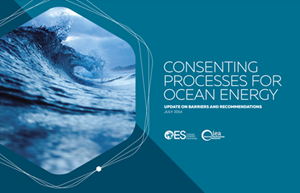

It is clear that the implementation of ocean energy projects in all the member countries faces challenges and barriers in the consenting process. Challenges encountered by the member countries causing delays in the process are related with uncertainties regarding environmental aspects and impacts of the projects, public acceptance and extended time of public consultations, governmental permits, judicial/legal rules opposed to practical solutions, lack of a one stop shop facility, uncertainties and lack of information of the different public decision makers, lack of guidance to developers and lastly maritime safety. Therefore, in order to help developers dealing with these challenges most of the countries have already implemented mechanisms for guidance and advice, either through websites, special committees, research centres or guidebooks. Efforts have been made by several member countries to streamline ocean energy consenting although in different ways.
The work proposed in this task will enable the the OES to meet its aspiration in addressing permitting and licensing issues within OES member countries.
A governance framework that enables the development of the ocean energy sector is still required in most OES member countries. Consenting processes are one element of this framework. These must be considered within much wider management frameworks that are now beginning to include Marine Spatial Planning and risk-based approaches as well as continued environmental protection and increasing need to ensure public acceptance. Whilst uncertainties with respect to environmental effects of ocean energy devices continue to be addressed through research programmes and collaborative efforts, there is a need to ensure that the knowledge generated from this work informs policy development and the future consenting processes to be applied to new and larger ocean energy developments.
The proposed programme of work has three key objectives:
In 2016 OES published a report outlining the main barriers and recommendations of the consenting process for ocean energy. The report can be downloaded at the bottom of the page.
 The progress of ocean energy projects in all the OES member countries continues to face challenges in relation to consenting processes. This can be detrimental to the sector and may also lead to delays in realising operational projects with consequences for budgeting and real costs to developers.
The progress of ocean energy projects in all the OES member countries continues to face challenges in relation to consenting processes. This can be detrimental to the sector and may also lead to delays in realising operational projects with consequences for budgeting and real costs to developers.
Particular emphasis has been placed on investigating the main barriers associated with permitting and licensing with a view to advising regulators and decision-makers on the key needs of the ocean energy sector from consenting processes.
Developers were also given the opportunity to provide their views and insights on barriers as experienced by them in consenting of their ocean energy projects to date.The report has paid particular attention to Marine Spatial Planning and how this is influencing consenting processes and ocean energy device deployments.
In addition, OES member representatives provided information on the authorities involved in consenting, the procedures within the consenting process, Environmental Impact Assessment, legislative and regulatory developments, consultation, guidance and test centres.
This forms a succinct overview of current practice with the aim of providing a holistic picture of the situation in each OES member country and draw tentative conclusions on whether more integrated approaches to planning are fully operational within OES countries.
The input to this report is based on information provided by decision and policy makers in the majority of cases. In an effort to balance the content, developers were asked about their experience of barriers to consenting of ocean energy projects, what changes could address those barriers and what opportunities and solutions would more widespread implementation of Marine Spatial Planning offer ocean energy developments.